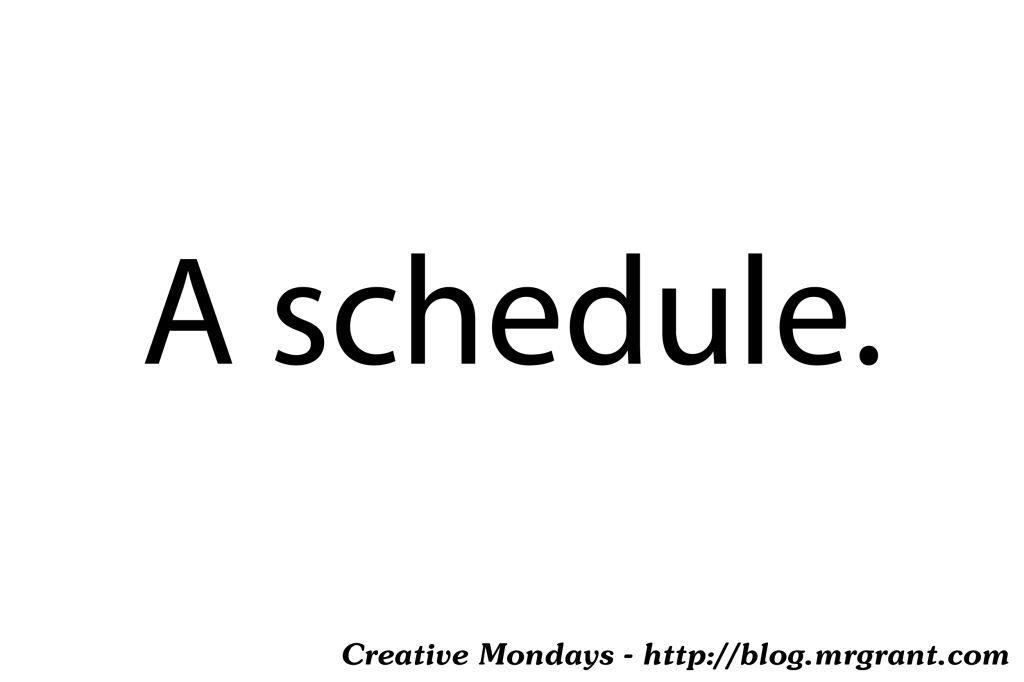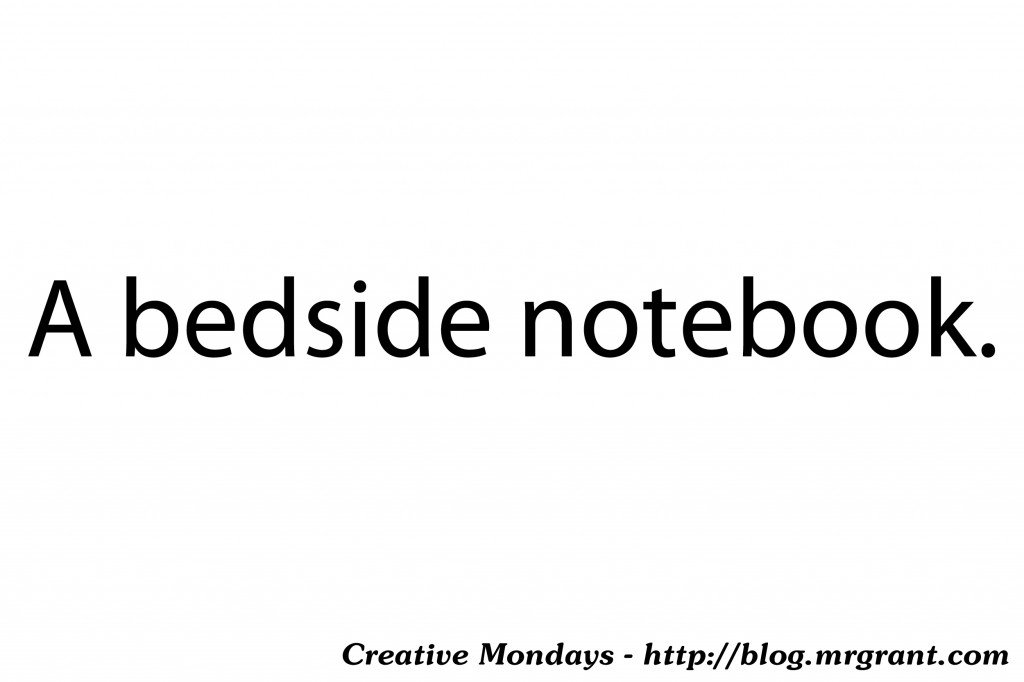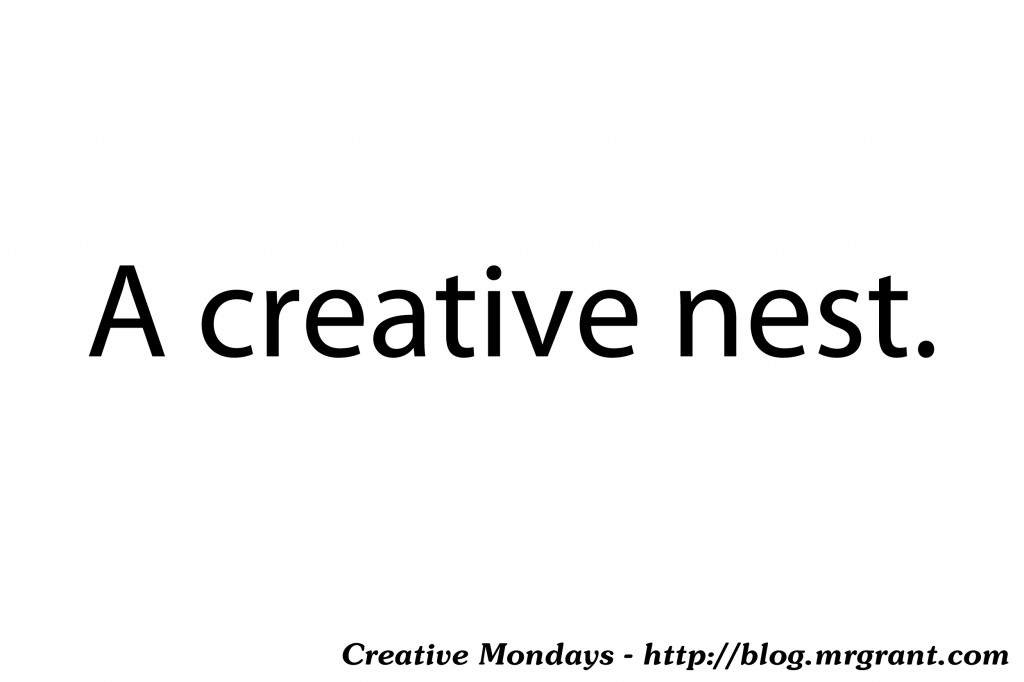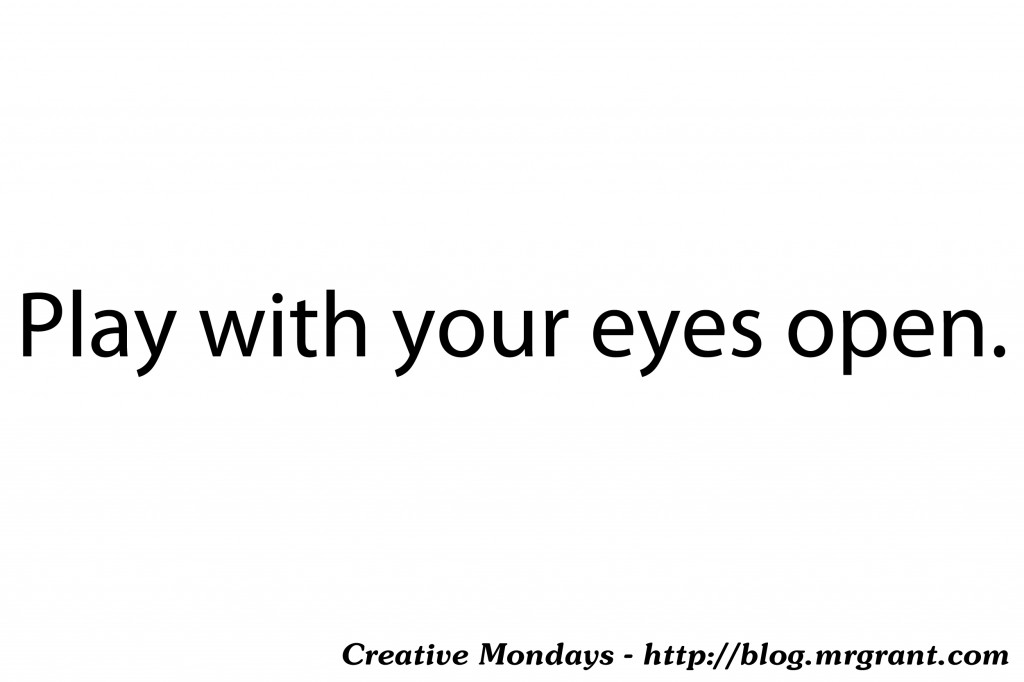Creative Mondays #044 – A Schedule

I believe I mentioned on here before my philosophy of “If you want to make (insert creative pursuit here) your job, you have to make it your job.” This is something that came to me when I decided to quit substitute teaching and focus, full time, on The Radio Adventures of Dr. Floyd.
This idea has been coming back to me a lot recently because, even though I get creative work sporadically, it has been a little slow and there’s no major work on the horizon. I have personal projects I want to work on but my days are spent lazing in the depression that my talents aren’t good enough. They aren’t valued. They are needed anywhere. Why work on things when there’s no point in doing so? Thanks negative brain. Thanks a lot.
Anyway, I’ve been thinking about refocusing on that mantra of ‘making creativity my job’ and started thinking more about creating a schedule for my creativity. When you work any job, you have a schedule. Why would a creative job be any different?
Right now it’s all in the early planning stages but I’m in the process of setting up a daily 9 to 5ish type schedule for myself. There are certain creative goals I want to accomplish and I think treating them like a ‘job’ even if I don’t get paid for it, will help get them done.
The setup I’m looking at is the schedule will work Monday through Friday. I would have to put in 6 to 8 hours a day into it, with short breaks in between.
The day would be broken up into different times to work on different projects. For example: 2 hours a day working on new songs for Throwing Toasters. 2 hours working on Uncle Interloper projects. 2 hours editing audio or video. At the start these would be rigidly timed with a timer set to go off at the end. Though, if I’m really working on something when the timer goes off, I’ll keep plowing through it.
The more I think about this set up, the more I like it. I also see how it’ll be tough to stick to but I think after a week or so, I should be able to kick it into a habit.
I’ll really treat is as job. Maybe I’ll even buy a time clock and make it official. I think this would also help get other goals in focus as well. My friend Joshua Zehner and I had a long discussion once about how having a ‘day job’ made us get a lot of creative work done because you could only do it in your free time. I’m hoping this creative day job I’m making for myself will help in that regard. For example, I’ve only read one book this year and I have a ton I want to get through. I’m hoping this schedule will free up more time to get things like that done. And I’m really looking at taking Saturday and Sundays off at the start.
The problem with setting a schedule, I think, is that you can’t schedule when inspiration will strike and you need to be flexible and open to that happening. But I’ve read a lot of articles that say if you schedule your creative time, inspiration will meet you there. I’m eager to find out. Also, this day job has to allow time off if ‘real’ work rears its head. Can’t turn that down.
—
Do you create on a schedule? If so, what is your schedule and how do you organize it? Let us know in the comments below! Have a great week!
Creative Mondays #043 – A bedside notebook.

This one is going to be one for the ‘duh’ column but it’s an important reminder for creative tyoes and our scattered right brians.
Keep a notebook and pen or pencil next to your bed so that when you have a inspirational thought (or dream) in the middle of the night, you can jot it down.
No matter how much you think to yourself that you’ll remember the idea in the morning, YOU WILL NOT. Okay, maybe you will every now and then, but do you really want to risk the possibility of losing a REALLY, REALLY good idea? No. THen keep the notebook by your bed.
Every year around the start of fall, stores like Rite-Aid, CVS or Walgreens sell those 70 page spiral notebooks for under a dollar. Usually something crazy like 60 cents or so. I usually pick up a few. Then, on my nightstand I put one of those notebooks, opened to a blank page with a pen resting right on top of it.
If inspiration strikes in the middle of the night, I reach for the notebook and pen without even turning on the light. Then, I slowly start writing down the idea on the page. I don’t worry about writing on the lines, I just try to write as deliberately neatly as possible in the dark so that in the morning I can read what I’ve written.
I write in big letters, turning the page if I get to the bottom. Again, the main goal is to get the idea down, not write a report you’re turning in for a grade. The reason for doing it in this manner is so I don’t have to turn on the light. Personally, if I turn on the light, I’ll be awake. This method really works for me.
In the morning I read through what I wrote and then transfer it to my Creative Idea Journal for further action. Once it is safely transferred, I will tear out the pages from the nighttime notebook and then place it back on my nightstand, ready for the next late night inspiration.
This is my method but you may have some other way of doing it. I’d thought about jotting the things down on my iPhone, but if you think light wakes me up, the iPhone would have me up answering emails.
This bedside notebook does the trick.
—
Do you have a method for recording those late night ideas or dreams? If so, let me know what it is in the comments below. Have a creative week!
Creative Mondays #041 – A Creative Nest

When reading about artists and creativity, I find you often hear mention of famous writers hanging out together. J.R.R. Tolkien and C.S. Lewis, Truman Capote and Harper Lee, Ralph Waldo Emerson and Louisa May Alcott, just to name a few. In Hollywood, we hear about actors and directors who enjoy handing out with each other. Just look at the fun J.J. Abrams and Zack Snyder are having poking fun at each other while directing the new Star Wars and Superman/Batman films. If you follow Weird Al Yankovic on Twitter you will see pictures of him hanging out with Seth Green or Thomas Lennon. For a few years now I’ve listened to the Nerd Poker Podcast which features a bunch of comedians hanging out playing Dungeons & Dragons, something they had done for over a decade before starting the podcast. These are just a few examples, I’m sure a much longer list can be made.
So, why is it that famous creative types seem to gravitate to each other? Is it because they are part of the famous elite and only hang out with other famous people? While that could be the case in a few cases, I think it is more likely because creative people gravitate towards each other and they especially gravitate to other creative people they find inspiring. I certainly know that this is true with me.
When we were in the heyday of Dr. Floyd, it was creatively inspiring to hang out with the shows co-creator, Doug. A simple meal or hour spent playing Nintendo 64 or other some such hangout would undoubtedly inspire future episodes of the show or funny lines to throw in here and there. Currently hanging out with puppeteer and puppet builder Russ Walko will inspire funny ideas for projects. I also find that hanging out with Patrick Bristow, Chris Sheets, Alison Mork, Brian Clark, Vanessa Whitney, Kevin Bertnson or any of the other fantastically funny founding members of Improvitorium with inspire creativity and fun.
I think that, as an artist, it is important to create for yourself a nest of creatives you can hang out with and who will inspire your own creativity. Creative friends you can laugh with, bounce ideas off of and receive input from with no expectation of credit or ownership. Build this nest with care so that you have people you truly be your creative self with when you are with them. These are people who aren’t competing with you, they are people who are there to support you and you, in turn, support them.
And because of the marvelous age we live in, they don’t necessarily have to be people who live close to you. I have several people who I would consider are in my ‘creative nest’ that live on the East Coast and we use all the wonders of technology to keep in touch. Author Mur Lafferty lives in North Carolina and we communicate via text and Twitter often. Singer/Songwriter Carla Ulbrich lives in New Jersey and we often chat via email or text. Musician John B. DeHaas lives in Florida and we talk almost daily via the Voxer app. With technologies like these, not to mention Skype or Google Hangouts, it is quite possible to have a creative nest that spans the entire globe!
Be thankful for the support and inspiration your creative nest gives you. And if you don’t have one, begin building it today! It will only make you a better artist.
—
Do you have a creative nest? If so how long have you had one and how did it help you? Let me know in the comments below! Have a great week!
